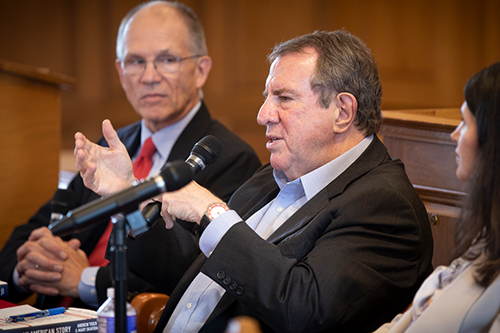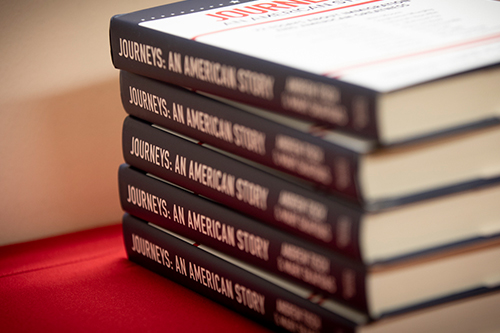This website uses cookies
We use cookies to ensure that we give you the best experience on our website. If you continue to use this site we will assume that you are happy with it.
Andrew H. Tisch, BS ’71, co-chairman of the board of Loews Corporation, was speaking at a swearing-in ceremony for one hundred new citizens at the New York Historical Society in 2016 when he looked out at the crowd and imagined the rich array of stories each person could tell.

Andrew Tisch speaking at book event
When he returned to the office the next day, he asked Mary Skafidas, vice president of investor relations and corporate communications at Loews: “What would happen if we wrote a book about immigration and we started to talk to people and started writing down their stories?”
Two years later, their book, Journeys: An American Story, a collection of seventy-two personal essays, was published by Rosetta Books. Tisch and Skafidas, who discussed their new book on September 18 at Cornell Law School, decided that instead of penning the stories themselves, they would let the contributors chronicle their own experiences of how their families arrived in America.
“I was surprised that so many people said yes so readily,” said Skafidas, who has written several op-ed columns with Tisch on immigration and other issues over the past five years. Her own story about her parents’ decision to leave Greece more than forty-five years ago and start a new life in Brooklyn is included in the book.

Copies of Andrew Tisch’s new book
The journey Tisch’s family took from Ukraine to Ellis Island in 1904 is also one of the featured essays. His grandfather, Avraham Tichinsky, who adopted his college nickname “Tisch” as his surname, started out in the garment business, making boys’ corduroy knickers, but later bought a pair of summer camps in Blairstown, New Jersey.
In 1946, Tichinsky’s sons, Larry and Bob, leased a hotel in Lakewood, New Jersey, then purchased it and launched a chain of hotels in New Jersey, New York, and Florida. Their company, which eventually became Loews Corporation, now employees nearly 20,000 people in hotels, insurance, oil exploration, natural gas pipelines, and packaging.
Other essays highlight the stories of many well-known Americans: Michael Bloomberg, former mayor of New York City; actors Marlo Thomas and Alan Alda; Elaine L. Chao, U.S. Secretary of Transportation; Nancy Pelosi, Democratic leader of the House of Representatives; and Andrew Cuomo, governor of New York.
“This book is a celebration of an enduring truth: that we Americans are—with the exception of the nation’s indigenous communities—all of us immigrants,” said Eduardo Peñalver, the Allan R. Tessler Dean and Professor of Law, at the authors’ talk in Myron Taylor Hall.
While the book portrays a cross-section of Americans, including undocumented immigrants and working-class citizens, what struck Tisch most about the essays was the different emotional responses of African Americans whose ancestors had arrived as slaves and others who came here voluntarily.
“When you read these stories, these are all great patriots, but you can see the raw emotion that for so many people—for so many Caucasians and others—coming to America was the great event in their family’s life,” he said. “For African Americans who came as slaves, coming to America was not the greatest event in their life. Getting here was so painful—it made me much more aware of the difference between the two.”
All proceeds from the book will be donated to the New York Historical Society and the Statue of Liberty-Ellis Island Foundation—two of the many philanthropic organizations for which Tisch serves as a board member.
A former vice chairman of the Cornell University Board of Trustees, Tisch has also been a longtime supporter of the university. In 2008, he and his wife, Ann, donated $35 million to Cornell to establish the Tisch University Professorships, which are awarded to honor and retain existing faculty and to recruit talented scholars and researchers from around the world.